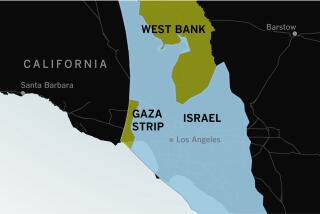Trinidad Reeling From Economic Woes, Brain Drain
- Share via
PORT OF SPAIN, Trinidad — The health service of Trinidad and Tobago has sunk into a crisis so severe that nurses wrap newborns in brown packing paper and hospital patients complain about cockroaches in their beds.
The health crisis is part of a general malaise whose symptoms include high unemployment, a sharply reduced standard of living and a steady drain of skilled citizens who seek a better life abroad.
After months of quiet complaints about steadily deteriorating conditions in the country’s state-run hospitals, hundreds of nurses took to the streets in demonstrations that left no doubt that Trinidad and Tobago is going though tough times.
Only a decade ago, the twin-island republic of 1.3 million people was the affluent jewel of the West Indies, with a per-capita income higher than that of any other island in the Caribbean chain.
The nurses’ grievances range from poor pay to the absence of even the most basic equipment.
As street protests gathered momentum in June, medical staff of one of the country’s biggest hospitals, in the city of San Fernando, ran out of baby blankets and started wrapping newborn infants in brown packing paper.
Patients at another hospital, at Point Fortin, told reporters that cockroaches and ants were routinely marching across their beds.
Elsewhere, hospital staff told of surgery by flashlight, urine-soaked mattresses, patients being asked to bring their own sheets and provide their own medicines.
“There are no syringes. There are not enough beds, there are no bedpans, few wheelchairs and not enough hospital trolleys,” said Dr. Kenrick Rennie, head of the Public Services Assn.
“It is difficult to imagine for people in the industrialized world but some of our hospitals don’t even have gauze.”
At the height of street protests in the capital, hundreds of nurses converged on the “Red House,” the ornate Parliament building in Port of Spain, waving placards and chanting slogans demanding the immediate resignation of health minister Emanuel Hosein.
In San Fernando, workers from other trade unions joined the nurses, represented by the PSA, in one of Trinidad and Tobago’s biggest anti-government demonstrations in a decade.
Hosein promised action to tackle the crisis and blamed the problems of the health sector on the previous government that had run Trinidad and Tobago during the oil bonanza that turned the country into the richest in the Caribbean.
“When we came (to power), there was not a cent in the kitty,” Hosein told Parliament as nurses outside demanded his removal. “We have the mandate but no money.”
The present government, led by Prime Minister A.N.R. Robinson, won a landslide victory in 1986 elections, taking 33 out of 36 seats in the House of Representatives and ending 30 years of uninterrupted rule by the People’s National Movement.
Diplomats here say many of the problems faced by Robinson, including the health crisis, are typical of countries whose economies depend chiefly on oil.
The oil boom of the late 1970s and early 1980s brought wealth and economic growth rates of 7% a year to Trinidad and Tobago. But since the collapse of oil prices in 1982, the one-legged economy has been in deep trouble. Government figures put unemployment at 23% and gross domestic product plunged from $6,856 per capita in 1982 to $3,043 in 1988.
To halt the decline, the Robinson Administration launched an ambitious program to lessen dependence on oil, attract foreign investors, and cut government spending in line with the standard prescriptions of the International Monetary Fund.
The government, Trinidad and Tobago’s biggest employer, introduced a 10% across-the-board wage cut and a 15% value-added tax, which cuts sharply into personal incomes.
Some 15,000 civil servants are being offered voluntary retirement under a rationalization program. So far, there have been few takers.
Reaction to the austerity package has been mixed. There has been praise from free-market advocates in Trinidad and the United States, the twin-islands’ biggest trade partner. There has been condemnation from the opposition and labor unions who say there are no signs of progress.
The government disagrees.
“We expect a return to economic growth this year for the first time since 1983,” said Bhoendradatt Tewarie, the minister of industry, enterprise and tourism. “We are hoping for 1% growth,” he said.
“But it is possible that we will have only 0.5.”
According to a Central Bank report issued early in July, real gross domestic product in the first quarter of 1990 was 0.6% below the 1989 figure.
More to Read
Sign up for Essential California
The most important California stories and recommendations in your inbox every morning.
You may occasionally receive promotional content from the Los Angeles Times.













